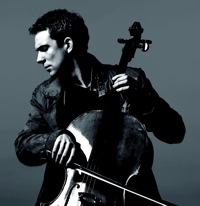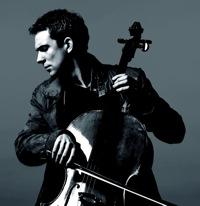Moser has joined forces with keyboardist and performance artist Phyllis Chen for a six-city U.S. swing that lands in San Francisco Jan. 19-20. The duo’s program, which ranges from the classical repertoire to newly commissioned works, forms the scaffold for a reinvigorated musical experience.

In these concerts, Moser, a 30-year-old marquee-name soloist who has appeared with the Chicago Symphony, the Cleveland Orchestra, the London Symphony, the New York Philharmonic, and many others, will employ a conventional cello, as well as prepared and electric versions of the instrument. Chen’s resources include prepared piano, toy piano, and music box. Some of her own compositions are on the bill.
Venue is another key component of the “Sounding Off” concept. The tour moves from small clubs to college campuses (Pepperdine University) to the financially beleaguered Detroit Institute of Art. It concludes Feb. 1 at New York’s alternative-arts destination, (Le) Poisson Rouge. Along the way, Moser and Chen will engage students of various ages and orientations in outreach activities. UC Berkeley business and marketing students are on tap here. High schoolers get the call in Detroit. The “Sounding Off” Web site features video clips of the cellist teaching a master class in Argentina and introducing Witold Lutoslawski and quarter-tone scales to Japanese children.
“Our hope is to create a sense of excitement and investment in our music-making through intimate and informal exchanges outside of a formal setting,” explains Moser. “The students will then enter the performances having a personal connection to the performers and a close connection to the artistic process.”
The “Sounding Off” Web site also captures Moser’s playfulness and droll sense of humor. In one clip, he and Chen conduct a giddy exploration of wine-glass vibrations. In others, Moser is seen sawing away at his cello as blaring boat horns, roaring jets, and the crashing of a felled tree drown him out. The latter comes off as a musing video-musical joke. Could a cellist’s bow have the power to topple a mighty tree?
Moser, whose international star rose when he won the Tchaikovsky Competition in 2002, has long maintained a creative tension with the traditional concert-hall setting. His musical forays into schools, hospitals. retirement homes, and hospices began when he was 19. “The more I played in those environments,” he says, “the more I learned that music can make a real difference in people’s lives, including mine.”
Reflecting on Tchaikovsky’s Rococo Variations, the piece that won him his big prize, Moser notes that “It’s a bit of a paradox to be intimate with 2,000 people.” As for the isolating cone that can settle over a solo musician, he says, “The higher up the ladder, the less honest feedback you get.”
By taking his music to smaller halls and clubs, where reverential silence may be replaced by chatter and clinking glasses, Moser pursues a mutually enriching endeavor. Artist and audience alike benefit when the barriers between them are challenged and rethought. Moser isn’t about to give up the concert hall — he performs the Shostakovich Cello Concerto No. 1 with the Milwaukee Symphony Orchestra the day before the “Sounding Off” tour begins in San Diego. Yet wherever he’s playing, Moser is focused on the complex connections between the sounds he’s making and the ways they are received.

